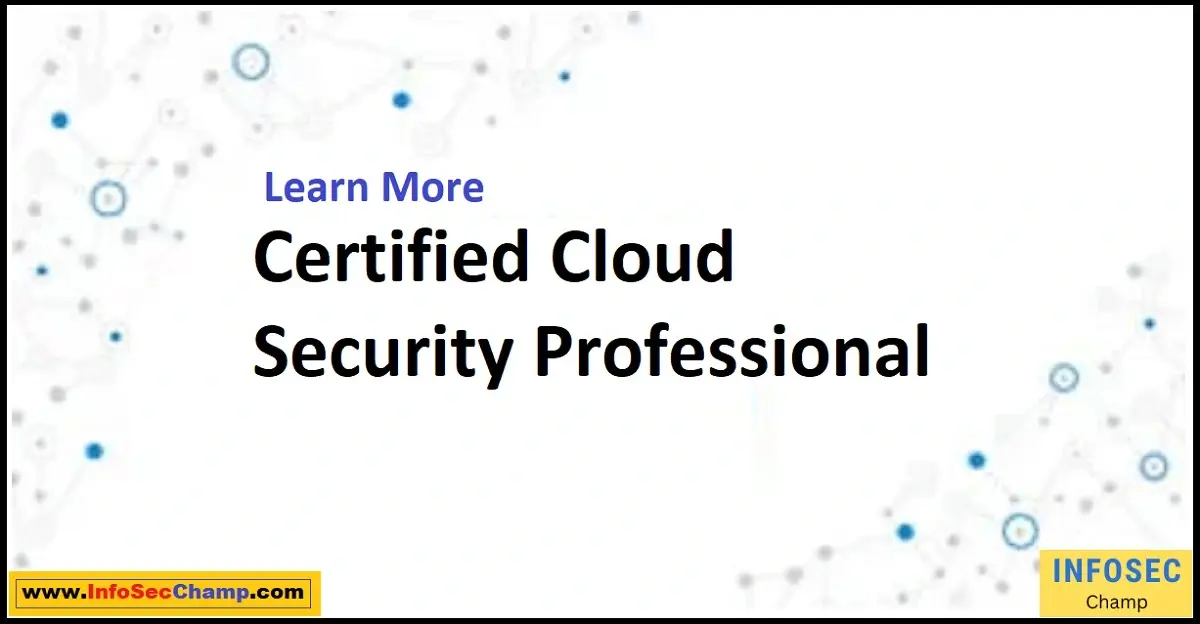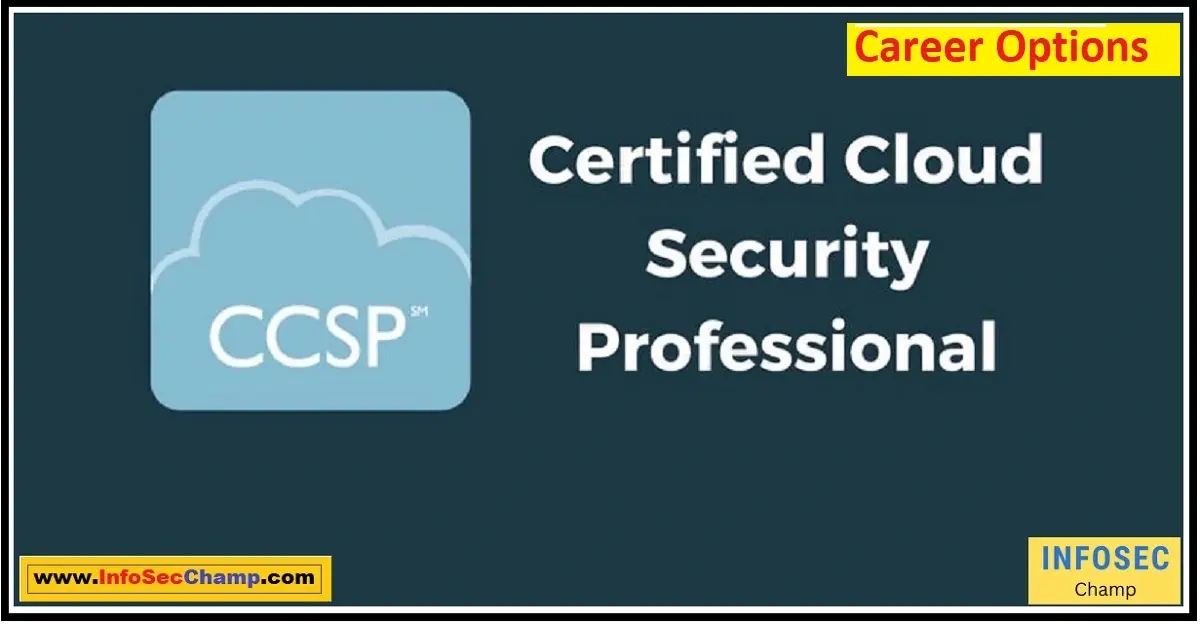Discover the incredible advantages of becoming a Certified Cloud Security Professional with our game-changing guide! In the era of cloud computing, the demand for skilled professionals in cloud security is skyrocketing, and obtaining your CCSP certification can open the door to a world of new opportunities. This comprehensive guide will help you navigate the ins and outs of the CCSP exam and unlock the secrets to achieving success in the cybersecurity industry.
Learn about the top resources, study strategies, and industry insights that will set you apart from the competition. From mastering the CCSP domains to acing the exam on your first try, this guide offers everything you need to become a Certified Cloud Security Professional. Don’t miss out on the chance to elevate your career and secure your future in the rapidly growing field of cloud security!
Why is becoming a Certified Cloud Security Professional essential for your career?
Becoming a Certified Cloud Security Professional (CCSP) is essential for your career for several reasons:
- Growing demand: With the increasing adoption of cloud services, organizations are seeking skilled professionals to ensure the security of their cloud infrastructure. CCSPs are in high demand, and this trend is expected to continue in the foreseeable future.
- Increased credibility: Earning a CCSP certification validates your knowledge and skills in cloud security, making you a more attractive candidate for employers.
- Higher earning potential: Certified Cloud Security Professionals often command higher salaries than their non-certified counterparts.
- Expanded career opportunities: CCSP certification can open the door to a variety of roles in the cybersecurity industry, including cloud security architect, cloud security engineer, and cloud security consultant.
- Professional development: Pursuing a CCSP certification helps you stay current with the latest advancements in cloud security and ensures that your skills remain relevant in the ever-evolving field of cybersecurity.
What are the key CCSP domains to focus on for the exam?
The CCSP exam covers six key domains that are essential for any cloud security professional to master:
- Cloud Concepts, Architecture, and Design: This domain focuses on understanding cloud computing concepts, cloud reference architectures, and cloud security considerations.
- Cloud Data Security: This domain covers data classification, data encryption, data storage, and data lifecycle management in a cloud environment.
- Cloud Platform and Infrastructure Security: In this domain, you’ll learn about securing cloud infrastructure, network security, virtualization, and container security.
- Cloud Application Security: This domain deals with securing cloud applications, including identity and access management, application development, and application security testing.
- Cloud Security Operations: This domain focuses on cloud security monitoring, incident response, and disaster recovery in a cloud environment.
- Legal, Risk, and Compliance: In this domain, you’ll learn about cloud-related legal issues, risk management, and compliance requirements.
To prepare for the CCSP exam, it’s crucial to allocate sufficient time to study each domain and understand its key concepts and best practices.
How can you effectively prepare for the Certified Cloud Security Professional exam?
To effectively prepare for the CCSP exam, follow these strategies:
- Review the exam outline: Familiarize yourself with the six domains covered by the exam and their respective weightage.
- Develop a study plan: Create a study schedule that allocates time for each domain, practice tests, and revision.
- Leverage official resources: Utilize the official (ISC)² CCSP Study Guide and other resources, such as the CCSP CBK, to gain in-depth knowledge of the exam content.
- Participate in training courses: Enroll in CCSP training courses, both online and in-person, to reinforce your understanding of the exam material.
- Practice with exam questions: Use practice tests and sample questions to familiarize yourself with the exam format and assess your preparedness.
- Join study groups: Connect with other CCSP candidates through online forums and social media groups to share resources, tips, and experiences.
- Stay updated on industry trends: Regularly read industry blogs and attend webinars and conferences to stay current with the latest developments in cloud security.
What is the value of a CCSP certification compared to other cybersecurity certifications?
The value of a CCSP certification compared to other cybersecurity certifications lies in its specific focus on cloud security. While other certifications, such as CISSP or CISM, provide a broad understanding of cybersecurity principles and best practices, the CCSP certification delves deeper into the unique challenges and requirements of securing cloud environments.
Here’s a comparison of the CCSP certification with other popular certifications:
- CCSP vs. CISSP: While the CISSP (Certified Information Systems Security Professional) is a well-established and highly regarded certification in the cybersecurity field, it covers a broader range of topics. The CCSP, on the other hand, specifically targets cloud security and is more focused on addressing the unique challenges of securing cloud environments.
- CCSP vs. CISM: The CISM (Certified Information Security Manager) certification is aimed at security management professionals and focuses more on the managerial aspect of information security. In contrast, the CCSP is more technical in nature and is better suited for professionals working directly with cloud security implementations and operations.
- CCSP vs. CompTIA Security+: The CompTIA Security+ certification is an entry-level certification that covers general security concepts and best practices. The CCSP is a more advanced certification and is specifically tailored to professionals with a strong background in information security and cloud computing.
In summary, the value of the CCSP certification lies in its specialization in cloud security, making it an ideal choice for professionals looking to enhance their expertise in this rapidly growing field.
Which industries are actively seeking Certified Cloud Security Professionals?
As cloud computing becomes increasingly prevalent across various industries, the demand for Certified Cloud Security Professionals is growing.
Some of the industries actively seeking CCSPs include:
- Information technology and services: This industry has a high demand for skilled cloud security professionals to protect sensitive data and ensure the security of cloud-based applications and services.
- Financial services: Banks, insurance companies, and other financial institutions are adopting cloud computing to enhance their services and improve operational efficiency. These organizations require CCSPs to safeguard their data and ensure regulatory compliance.
- Healthcare: The healthcare industry is embracing cloud technology for data storage, electronic health records, and telemedicine. CCSPs are needed to protect patient data and ensure compliance with privacy regulations.
- Retail: Retailers are increasingly leveraging cloud-based platforms for e-commerce, inventory management, and data analytics. Certified Cloud Security Professionals help secure these platforms and protect customer data.
- Government: As government agencies transition to cloud-based solutions for improved efficiency and cost savings, they require CCSPs to ensure data security and compliance with various regulations.
These are just a few examples of the many industries actively seeking Certified Cloud Security Professionals. As cloud adoption continues to grow, the demand for skilled cloud security professionals will likely increase across various sectors.

What are the top resources for aspiring Certified Cloud Security Professionals?
There are numerous resources available for aspiring CCSPs to help them prepare for the exam and gain valuable knowledge in cloud security.
Some top resources include:
- Official (ISC)² CCSP Study Guide: This comprehensive guide covers all six domains tested in the CCSP exam and provides in-depth explanations, examples, and self-assessment questions.
- (ISC)² CCSP CBK: The Common Body of Knowledge (CBK) is a collection of essential knowledge for cloud security professionals and serves as a foundation for the CCSP exam.
- CCSP training courses: Several organizations offer CCSP training courses, both online and in-person, that provide structured learning and help reinforce exam content.
- Practice exams: Using practice exams and sample questions can help familiarize you with the exam format and assess your preparedness.
- Online forums and study groups: Connecting with other CCSP candidates through online forums and social media groups can provide valuable insights, tips, and support.
- Industry blogs and publications: Regularly reading industry blogs and publications will help you stay updated on the latest trends and developments in cloud security.
By utilizing these resources and dedicating sufficient time to study, aspiring CCSPs can effectively prepare for the exam and enhance their knowledge in the field of cloud security.
How can a CCSP certification enhance your earning potential?
A CCSP certification can significantly enhance your earning potential for several reasons:
- Increased demand: As more organizations adopt cloud services, the demand for skilled cloud security professionals continues to grow. This demand often translates into higher salaries for certified professionals.
- Greater credibility: A CCSP certification demonstrates your expertise and commitment to the field of cloud security, making you a more attractive candidate for employers and potentially leading to better job offers and higher salaries.
- Specialized skills: The CCSP certification validates your specialized skills in cloud security, which can set you apart from other cybersecurity professionals without a cloud security background. This specialization can lead to more lucrative job opportunities.
According to various salary surveys and industry reports, Certified Cloud Security Professionals often earn higher salaries compared to their non-certified counterparts. While the exact salary increase will depend on factors such as experience, location, and job role, obtaining a CCSP certification can significantly boost your earning potential in the cybersecurity field.
What are the most common challenges faced by Certified Cloud Security Professionals?
Certified Cloud Security Professionals often face several challenges in their roles, including:
- Keeping up with evolving technology: Cloud technology is constantly evolving, which means that CCSPs must continually update their knowledge and skills to stay relevant in the field.
- Addressing compliance requirements: Ensuring compliance with various industry-specific regulations and standards can be a complex task, especially in a rapidly changing cloud environment.
- Securing multi-cloud environments: Many organizations use multiple cloud service providers, making it more challenging for CCSPs to implement consistent security controls and policies across different platforms.
- Balancing security and usability: CCSPs must strike a delicate balance between implementing robust security measures and maintaining user-friendly cloud services that don’t hinder productivity or performance.
- Managing cloud vendor risks: CCSPs must assess and manage risks associated with their organization’s reliance on third-party cloud service providers, including data breaches, service outages, and data loss.
By staying current with industry developments, collaborating with other cybersecurity professionals, and participating in ongoing professional development, CCSPs can effectively address these challenges and successfully secure their organization’s cloud infrastructure.
How long does it take to become a Certified Cloud Security Professional?
The time it takes to become a CCSP depends on several factors, such as your existing knowledge and experience in information security and cloud computing, the amount of time you can dedicate to studying, and the availability of exam dates. Generally, it takes candidates anywhere from 3 to 12 months to prepare for the CCSP exam.
Keep in mind that the CCSP certification has eligibility requirements, including a minimum of five years of full-time work experience in information technology, with at least three years in information security and one year in one of the six CCSP domains. This work experience should be considered when estimating the time it takes to become a Certified Cloud Security Professional.
What are the continuing education requirements for maintaining your CCSP certification?
To maintain your CCSP certification, you must fulfill the Continuing Professional Education (CPE) requirements set by (ISC)².
These requirements include:
- Earning CPE credits: You must earn a total of 90 CPE credits within each three-year certification cycle, with a minimum of 30 CPE credits per year.
- Types of CPE activities: CPE credits can be earned through various activities, such as attending educational events, participating in training courses, self-study, teaching or presenting, volunteering, and authoring articles or publications related to cloud security.
- Annual maintenance fee: You must pay an annual maintenance fee (AMF) to (ISC)² to maintain your certification. The AMF for the CCSP certification is $125 per year.
By fulfilling the CPE requirements and paying the annual maintenance fee, you ensure that your CCSP certification remains active and that your knowledge and skills in cloud security stay up-to-date. This not only helps you maintain your professional credibility but also supports your ongoing career growth in the field of cybersecurity.
It’s important to keep track of your CPE activities and submit them to (ISC)² regularly to avoid lapses in your certification. If you fail to meet the CPE requirements or pay the AMF, your certification may be suspended or revoked, requiring you to retake the exam to regain your CCSP certification.
Conclusion:
As organizations increasingly adopt cloud computing, the need for skilled cloud security professionals is greater than ever. Obtaining your Certified Cloud Security Professional (CCSP) certification can significantly enhance your career prospects and earning potential.
With a CCSP certification, you’ll demonstrate your expertise in the field of cloud security, validating your skills and making you a more attractive candidate for employers in various industries.
By becoming a CCSP, you’ll be equipped with the knowledge and skills to address the unique challenges of securing cloud environments, and ensuring your organization’s data and infrastructure are protected.
Don’t miss out on the opportunity to elevate your career in the rapidly growing field of cloud security. Start preparing for the CCSP exam today and unlock the doors to exciting new opportunities in the cybersecurity industry.

FAQs
Q: What are the key domains covered in the CCSP exam?
A: The CCSP exam covers six key domains: Cloud Concepts, Architecture, and Design; Cloud Data Security; Cloud Platform and Infrastructure Security; Cloud Application Security; Cloud Security Operations; and Legal, Risk, and Compliance.
Q: How can I effectively prepare for the CCSP exam?
A: To effectively prepare for the CCSP exam, you should develop a study plan, utilize official resources, participate in training courses, practice with exam questions, join study groups, and stay updated on industry trends.
Q: What are the continuing education requirements for maintaining a CCSP certification?
A: To maintain your CCSP certification, you must earn a total of 90 CPE credits within each three-year certification cycle, with a minimum of 30 CPE credits per year, and pay an annual maintenance fee of $125.
Q: How difficult is the CCSP exam?
A: The CCSP exam is considered moderately difficult, as it requires a deep understanding of cloud security concepts and best practices. Thorough preparation, including studying the six key domains and utilizing various resources, is essential for success.
Q: What is the passing score for the CCSP exam?
A: The passing score for the CCSP exam is 700 out of 1000 points. The exam consists of 125 multiple-choice questions, and candidates have a total of three hours to complete it.
Q: Can I take the CCSP exam without experience?
A: No, the CCSP certification has eligibility requirements that include a minimum of five years of full-time work experience in information technology, with at least three years in information security and one year in one of the six CCSP domains.
Golden Quote:
“Earning your CCSP certification is a game-changer for your career in the ever-evolving world of cybersecurity.”

